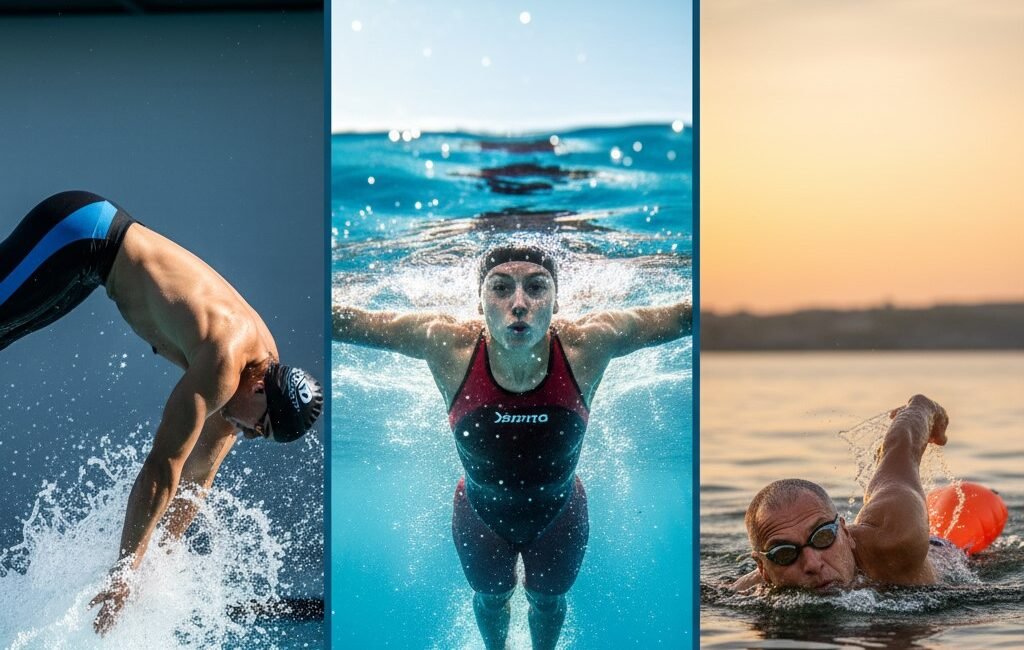
For many, swimming begins as a life skill or a summer hobby. But as soon as you dive into the world of competitive training, time trials, and stroke perfection, you realize something deeper — swimming isn’t just an activity; it’s a serious sport.
At LegendarySwimmers.com, we explore how swimming evolved from a simple survival skill into one of the world’s most respected and demanding sports.
What Defines a Sport?
Before deciding whether swimming qualifies, let’s break down what a sport actually means.
An activity is recognized as a sport when it involves:
Physical effort and athletic skill
Competition with measurable performance
Structured rules and organized events
Swimming meets all of these criteria. Whether you’re racing in a pool or open water, you rely on strength, technique, and precision under strict regulations set by World Aquatics (formerly FINA).
Why Swimming Is Undeniably a Sport
Competitive swimming is built on precision, discipline, and endurance. Athletes train year-round to master every aspect of their strokes—freestyle, backstroke, butterfly, and breaststroke.
Each race is measured down to milliseconds, where a single mistake can determine a win or loss. That level of pressure, skill, and consistency firmly places swimming in the realm of serious athletic competition.
The Physical Demands Behind Every Stroke
Swimming is one of the most physically comprehensive sports. It requires the power of a sprinter, the endurance of a cyclist, and the flexibility of a gymnast—all working together in water.
Professional swimmers often train for 20+ hours a week, focusing on:
Building upper-body and core strength
Enhancing lung capacity and breathing control
Perfecting form and hydrodynamics
Few sports test every muscle group as effectively as swimming does.
The Mental Game: Focus and Endurance
Swimming is as much a mental challenge as a physical one. Underwater silence, repetitive motion, and long training hours require deep concentration and mental resilience.
Swimmers must stay focused on rhythm, breathing, and timing—while maintaining calm in a race that can be won or lost by hundredths of a second.
This mental discipline is why many consider swimming one of the purest tests of athletic focus.
Why Some Still Think Swimming Isn’t a Sport
The misconception often comes from how people experience swimming. For most, it’s recreational—something you do for fun, relaxation, or fitness.
But when structured training, competition, and measurable results enter the picture, swimming transforms into a full-fledged sport.
At LegendarySwimmers.com, we highlight how swimmers follow intense regimens just like track runners, boxers, or gymnasts.
Swimming on the Olympic Stage
Since the first modern Olympics in 1896, swimming has been a centerpiece of the Games.
Legends like Michael Phelps, Katie Ledecky, and Mark Spitz have shown the world the dedication and power required to reach the top.
The Olympic platform proves that swimming not only meets the criteria of a sport—it sets the gold standard for athletic excellence.
Teamwork in the Water
Though it looks like an individual pursuit, swimming is built on community. From relay races to team training sessions, swimmers rely on each other for motivation, pacing, and shared goals.
This blend of individual discipline and team collaboration gives swimming a rare dual identity—a solo challenge with a team spirit.
Health, Fitness, and Lifelong Rewards
Even beyond competition, swimming provides life-changing physical and mental benefits:
Builds endurance and cardiovascular strength
Increases flexibility and mobility
Reduces stress and supports mental health
Provides low-impact training for all ages
It’s one of the few sports that strengthens your body while being gentle on your joints.
Final Verdict: Yes, Swimming Is 100% a Sport
Swimming isn’t just an activity—it’s a complete sport that combines strength, strategy, and mental focus.
From casual training sessions to Olympic finals, it demands everything a true athlete can give.
If you’re ready to dive deeper into swimming techniques, training guides, and expert insights, visit LegendarySwimmers.com — your go-to resource for everything in the water world.
FAQs About Swimming as a Sport
1. Why is swimming considered a sport?
It involves physical effort, competition, and official rules—meeting every definition of a sport.
2. What makes swimming more challenging than other sports?
It combines breath control, resistance, and full-body coordination in a unique environment.
3. Is swimming good for building strength?
Yes, it tones nearly every muscle group while improving stamina and core stability.
4. How often do swimmers train?
Professional swimmers usually train 5–6 days a week, focusing on both water and dry-land exercises.
5. Is swimming suitable for beginners or only athletes?
It’s perfect for everyone—from beginners learning the basics to elite athletes chasing medals.

